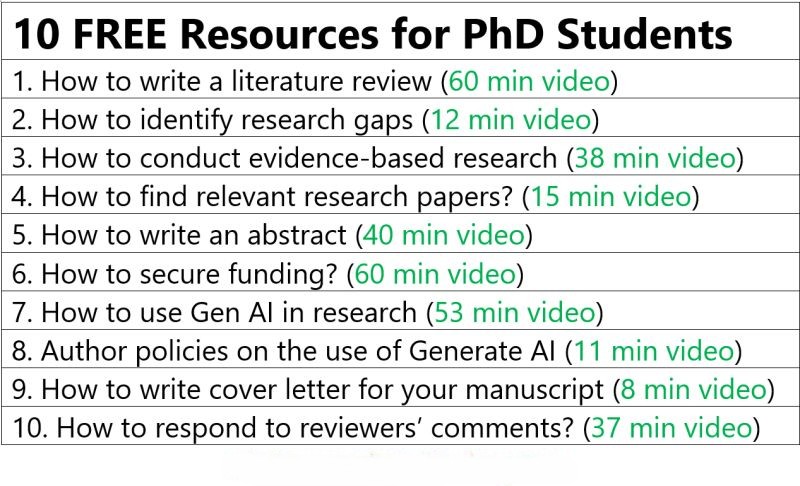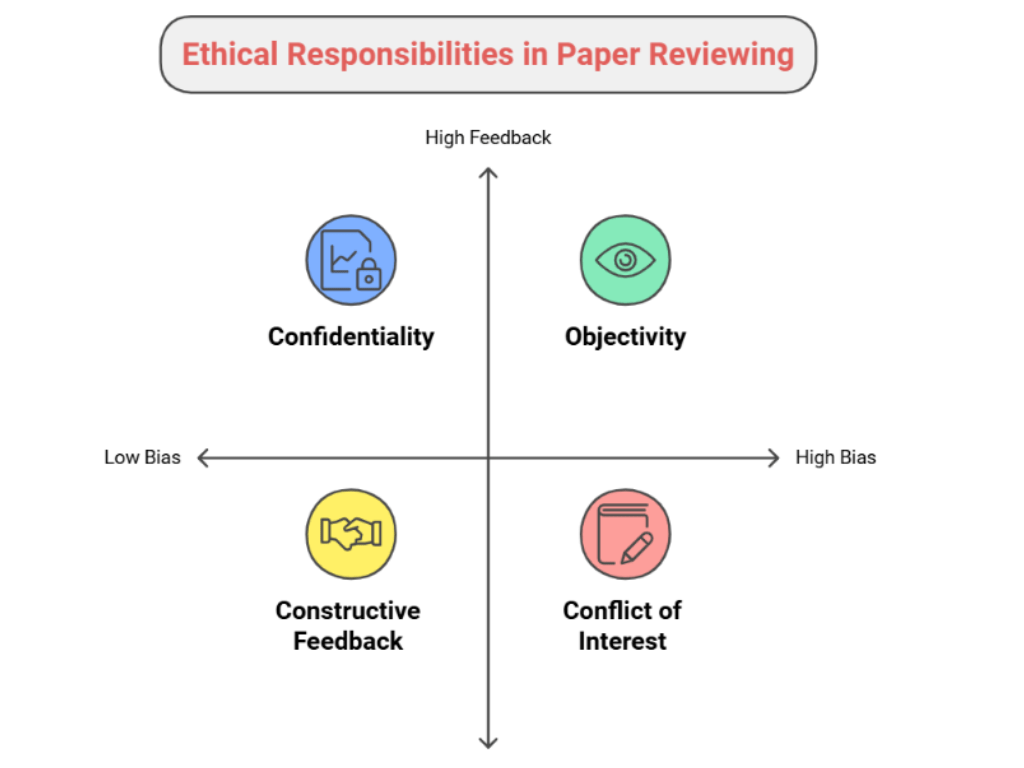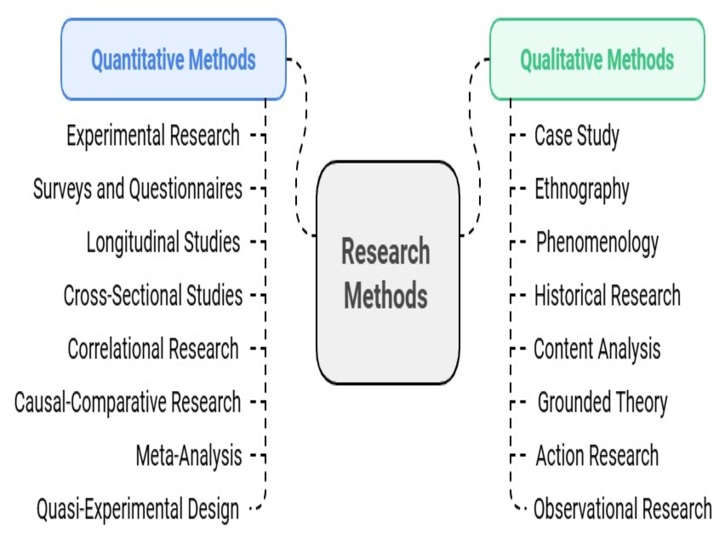
Conducting research requires more than hard work, it demands strategy, preparation, and continuous learning. Whether you’re drafting your first manuscript or responding to reviewers, having the right guidance can make a world of difference.
Here’s a breakdown of 10 essential resources that can help you excel at each step of your PhD journey.

1. How to Write a Literature Review
Writing an effective literature review is about more than summarizing research—it’s your opportunity to shape the conversation in your field.
• Conceptualizing and structuring a review article.
• How to make your review stand out.
• Common myths about review articles.
Why It Matters: A strong literature review highlights trends, debates, and future research directions.
Watch Here: https://shorturl.at/tVo8Y
2. How to Identify Research Gaps
Identifying a research gap can feel like finding a needle in a haystack. But with the right tools and strategies, it becomes much easier.
What You’ll Learn:
• What a research gap is and why it’s important.
• Steps to identify research gaps efficiently.
• Tools that help you uncover unexplored areas in your field.
Why It Matters: Research gaps pave the way for meaningful contributions to your field.
Watch Here: https://shorturl.at/rAeAI
3. How to Conduct Evidence-Based Research
Contrary to popular belief, not all research is evidence-based. Systematic and transparent approaches to using citations are critical for research reliability.
What You’ll Learn:
• Key steps for conducting evidence-based research.
• How to strengthen your study’s credibility through systematic reviews.
• Strategies to avoid research duplication and waste.
Why It Matters: Evidence-based research ensures your work adds value rather than repeating past mistakes.
Watch Here: https://shorturl.at/YFddu
4. How to Find Relevant Research Papers
Finding relevant and up-to-date research can be overwhelming. This module introduces self-paced training for using Scopus to simplify your research process.
What You’ll Learn:
• How to perform basic and advanced searches.
• Saving searches and setting up alerts.
• Exporting and organizing your search results.
Why It Matters: Efficient searches help you stay updated and build a comprehensive literature review.
Watch Here: https://shorturl.at/ln2Re
5. How to Write an Abstract
Your abstract determines whether your paper gets read or even reviewed. It’s the first impression of your work, so make it count!
What You’ll Learn:
• Why abstracts are crucial for your paper’s visibility.
• Ideal abstract length and content structure.
• The kind of language that works best in an abstract.
Why It Matters: A well-crafted abstract increases the chances of your paper being cited.
Watch Here: https://shorturl.at/xAR4d
6. How to Secure Funding
Securing research funding can feel like a daunting task, but understanding what funders look for can make all the difference.
What You’ll Learn:
• How to write a winning grant application.
• Key elements that make your proposal stand out.
• Common mistakes to avoid when applying for funding.
Why It Matters: Funding is essential for pursuing impactful research and expanding your academic career.
Watch Here: https://shorturl.at/nuBm7
7. How to Use Generative AI in Research
Generative AI is transforming how researchers find and analyze information. Learn how tools like Scopus AI can revolutionize your research workflow.
What You’ll Learn:
• The impact of generative AI on research practices.
• A live demonstration of Scopus AI in action.
• Future trends in generative AI for research.
Why It Matters: Staying ahead of technological advancements can improve your research efficiency.
Watch Here: https://shorturl.at/r203W
8. Author Policies on the Use of Generative AI
As generative AI becomes more common, ethical concerns around its use in research have grown.
What You’ll Learn:
• Common ethical dilemmas related to generative AI.
• Opportunities and risks associated with using AI in academic work.
• Current author guidelines and policies around AI use.
Why It Matters: Understanding ethical guidelines helps you use AI tools responsibly in your research.
Watch Here: https://shorturl.at/pX9eZ
9. How to Write a Cover Letter for Your Manuscript
A compelling cover letter can set your manuscript apart during the submission process.
What You’ll Learn:
• Why cover letters are important for manuscript submissions.
• Key components of a strong cover letter.
• How to address your editor and highlight your manuscript’s value.
Why It Matters: A well-written cover letter increases your chances of getting your paper sent for review.
Watch Here: https://shorturl.at/ACBSP
10. How to Respond to Reviewers’ Comments
Reviewer feedback can make or break your chances of getting published. Knowing how to respond constructively is crucial.
What You’ll Learn:
• Interpreting reviewers’ comments objectively.
• Writing clear and respectful responses.
• Best practices for revising your manuscript based on feedback.
Why It Matters: A strong response to reviewers can turn a “maybe” into an “accepted.”
Watch Here: https://shorturl.at/lWYYN
Final Thoughts
Whether you’re new to research or preparing for your next big publication, these resources can support you at every step.
Action Step: Pick one resource from above that aligns with your current research stage and commit to using it this week.
Which of these modules do you find most helpful? Reply to this email and let us know

Find me on X , Youtube and LinkedIn
Things you don’t want to miss!
1. Missed my new video, ” How to review a research paper? ” Don’t worry—you can watch the full session on my YouTube channel.



I do consider all the concepts you have offered for your post. They’re really convincing and will definitely work. Nonetheless, the posts are very short for beginners. May just you please extend them a bit from subsequent time? Thank you for the post.
I simply wanted to write down a small note in order to say thanks to you for these wonderful suggestions you are giving at this site. My prolonged internet lookup has finally been recognized with really good insight to talk about with my colleagues. I ‘d admit that most of us website visitors actually are quite lucky to live in a wonderful community with very many awesome people with interesting points. I feel somewhat happy to have discovered your entire site and look forward to many more thrilling moments reading here. Thank you once again for all the details.